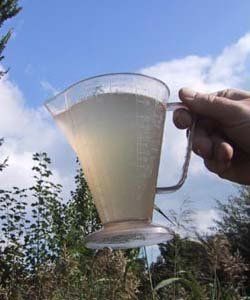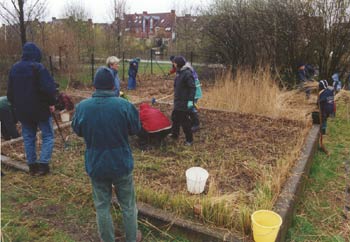Our biological sewage treatment plant

No discharge of waste water into the public sewer
The central connecting element of the ecological settlement is the handling of faeces and wastewater: the houses are not connected to the public sewer system, but each have a connection to the settlement's own herbal sewage treatment plant (STP) for the gray water, that is the domestic sewage without faeces. Each house has a self-sufficient large-chamber dry toilet for the faeces.
History of our biological STP
A biological STP with a reed horizontal filter was set up with the construction of the settlement in 1988. This could not provide the necessary cleaning service, especially for the still growing number of settlement residents.
In 1994 the PKA was converted into its current form under the management of the company AWA Braunschweig: Now the system works problem-free for the gray water of 140 people and a waste water volume of 15 m³ per day.


Cleaning performance better than prescribed
The first cleaning stage consists of several sedimentation shafts and an Emscher well, in which suspended and solids are separated from the bathing, washing and other wastewater. The core of the PKA is formed by three reed beds with a total area of approx. 240 square meters, which are designed as vertical filters that are fed at intervals.
Only for extreme complications the system does also have an emergency connection to the public sewer system.
Controlled cleaning performance
In the three beds of the PKA, the entire wastewater of the 36 houses of the eco-settlement is biologically cleaned by microorganisms to such an extent that it can then be safely discharged into the adjacent canal of the district.
The prerequisite for this are regular inspections of the treated wastewater for compliance with the discharge values prescribed by the supervisory authority. The six-monthly inspection shows that the purification performance of the plant-based sewage treatment system is far higher than officially required.


Continuous maintenance required
In addition to the daily maintenance, which is carried out by our voluntary STP team, the STP must be thoroughly cleaned at least once a year: shafts are cleaned, the reeds are mowed and new ones planted, weeds are removed, the fining pond is freed of duck silt. Here, all residents of the settlement are asked to take part for one afternoon.


